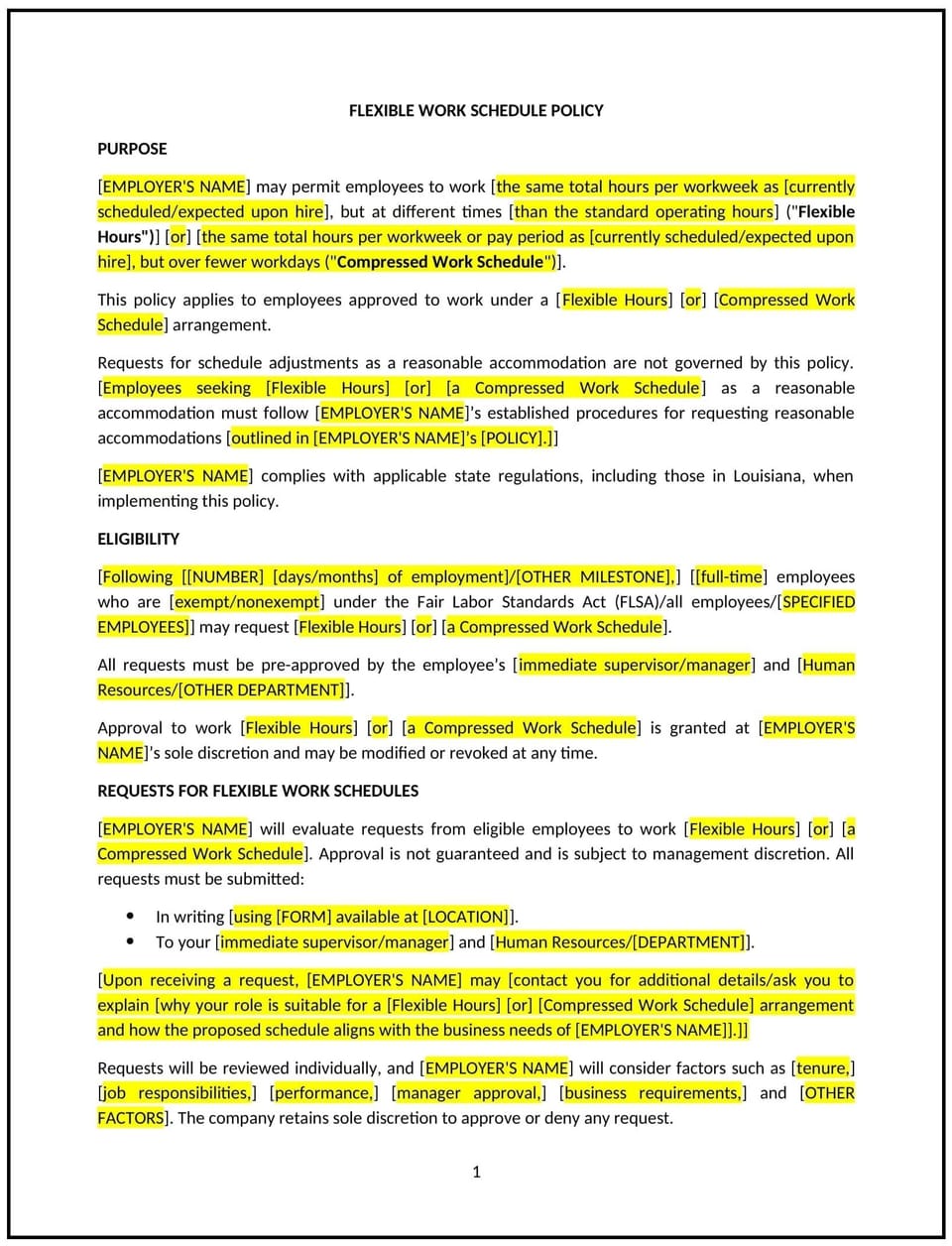Flexible work schedule policy (Louisiana): Free template

Flexible work schedule policy (Louisiana)
This flexible work schedule policy is designed to help Louisiana businesses provide employees with options for adjusting their work hours or locations to better balance professional and personal responsibilities. It outlines eligibility, procedures, and expectations for maintaining productivity and accountability while offering flexibility.
By implementing this policy, businesses can support employee well-being, enhance retention, and adapt to modern workplace needs.
How to use this flexible work schedule policy (Louisiana)
- Define eligibility: Specify which roles or employees are eligible for flexible work arrangements based on job responsibilities and business needs.
- Describe flexible options: Provide examples of allowable arrangements, such as adjusted start and end times, compressed workweeks, or remote work.
- Outline the application process: Detail how employees can request a flexible schedule, including required documentation and approval timelines.
- Set performance expectations: Clarify productivity, communication, and availability standards for employees on flexible schedules.
- Include review and evaluation: Establish procedures for periodically assessing the effectiveness of flexible arrangements.
- Address termination of arrangements: Specify conditions under which a flexible schedule may be modified or discontinued by the employer.
Benefits of using a flexible work schedule policy (Louisiana)
Implementing this policy provides several advantages for Louisiana businesses:
- Enhances employee satisfaction: Supports work-life balance and reduces stress.
- Boosts retention: Encourages employees to remain with the company by offering adaptable work options.
- Improves productivity: Allows employees to work during their most productive hours or in environments that suit them.
- Reduces absenteeism: Minimizes disruptions caused by personal commitments or travel.
- Reflects Louisiana-specific needs: Adapts to local workplace trends and cultural expectations.
Tips for using this flexible work schedule policy (Louisiana)
- Communicate clearly: Ensure all employees understand the policy and its requirements during onboarding and through periodic reminders.
- Train managers: Equip supervisors to evaluate and manage flexible work requests effectively and fairly.
- Monitor performance: Use clear metrics to assess the impact of flexible arrangements on productivity and team dynamics.
- Encourage communication: Foster open dialogue between employees and managers to address concerns or adjustments.
- Update regularly: Revise the policy to reflect changes in business needs, technology, or Louisiana regulations.
Q: Who is eligible for a flexible work schedule under this policy?
A: Eligibility is typically based on factors like job responsibilities, performance history, and the ability to meet business needs while working flexibly.
Q: What types of flexible work arrangements are available?
A: Options may include adjusted start and end times, compressed workweeks, remote work, or a hybrid arrangement combining in-office and remote work.
Q: How can employees request a flexible work schedule?
A: Employees should submit a formal request to their manager or HR, including details about the proposed schedule and how they will maintain productivity.
Q: Are employees on flexible schedules required to meet specific performance standards?
A: Yes, employees are expected to meet the same performance, productivity, and communication standards as those on traditional schedules.
Q: Can a flexible work schedule be changed or terminated?
A: Yes, flexible arrangements may be modified or discontinued based on business needs, employee performance, or other factors, with appropriate notice.
Q: How often should this policy be reviewed?
A: The policy should be reviewed annually or when workplace dynamics or Louisiana-specific regulations change.
Q: What tools can businesses use to manage flexible work arrangements?
A: Businesses can use collaboration tools, time-tracking software, and communication platforms to support employees on flexible schedules.
This article contains general legal information and does not contain legal advice. Cobrief is not a law firm or a substitute for an attorney or law firm. The law is complex and changes often. For legal advice, please ask a lawyer.


